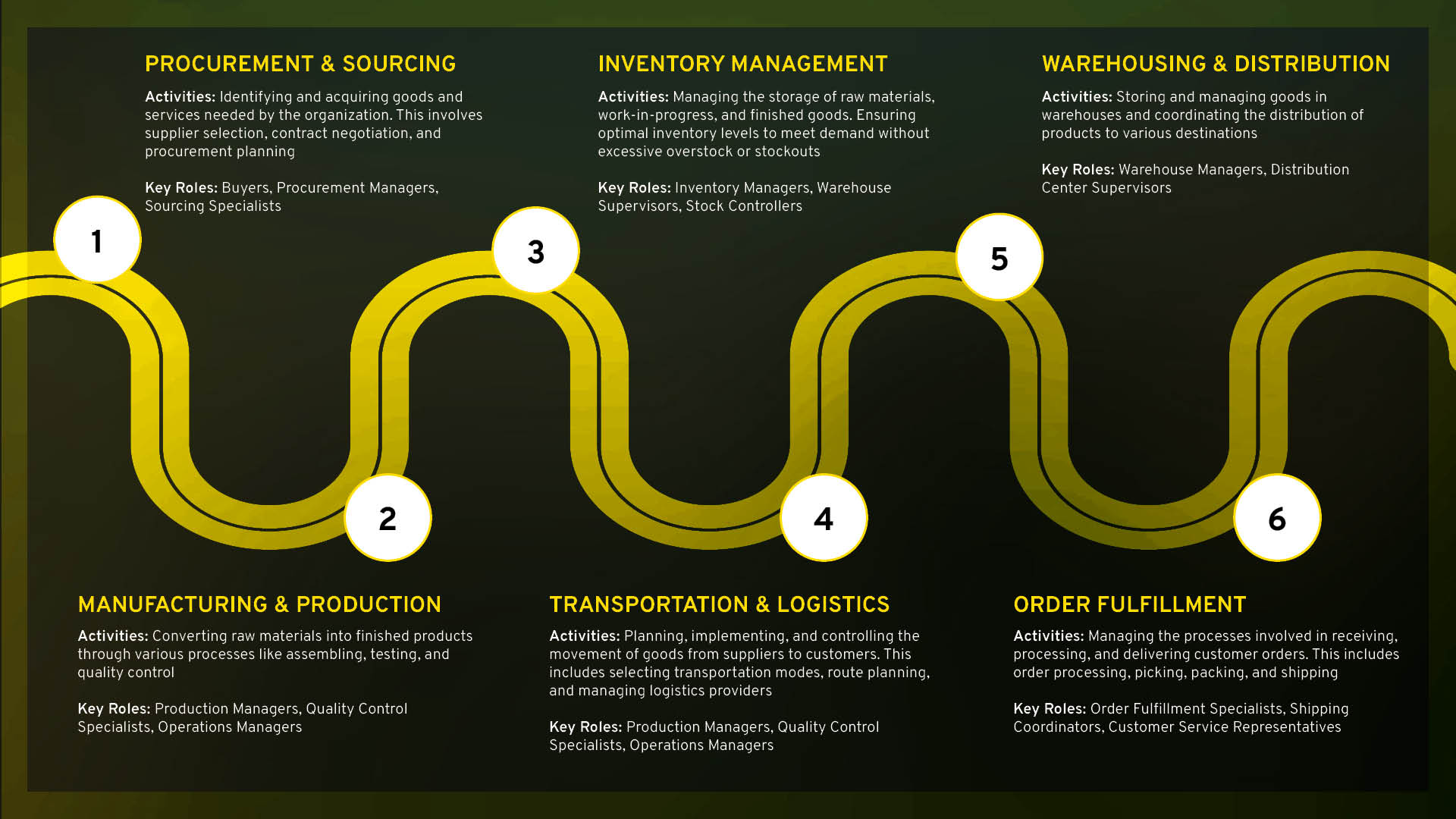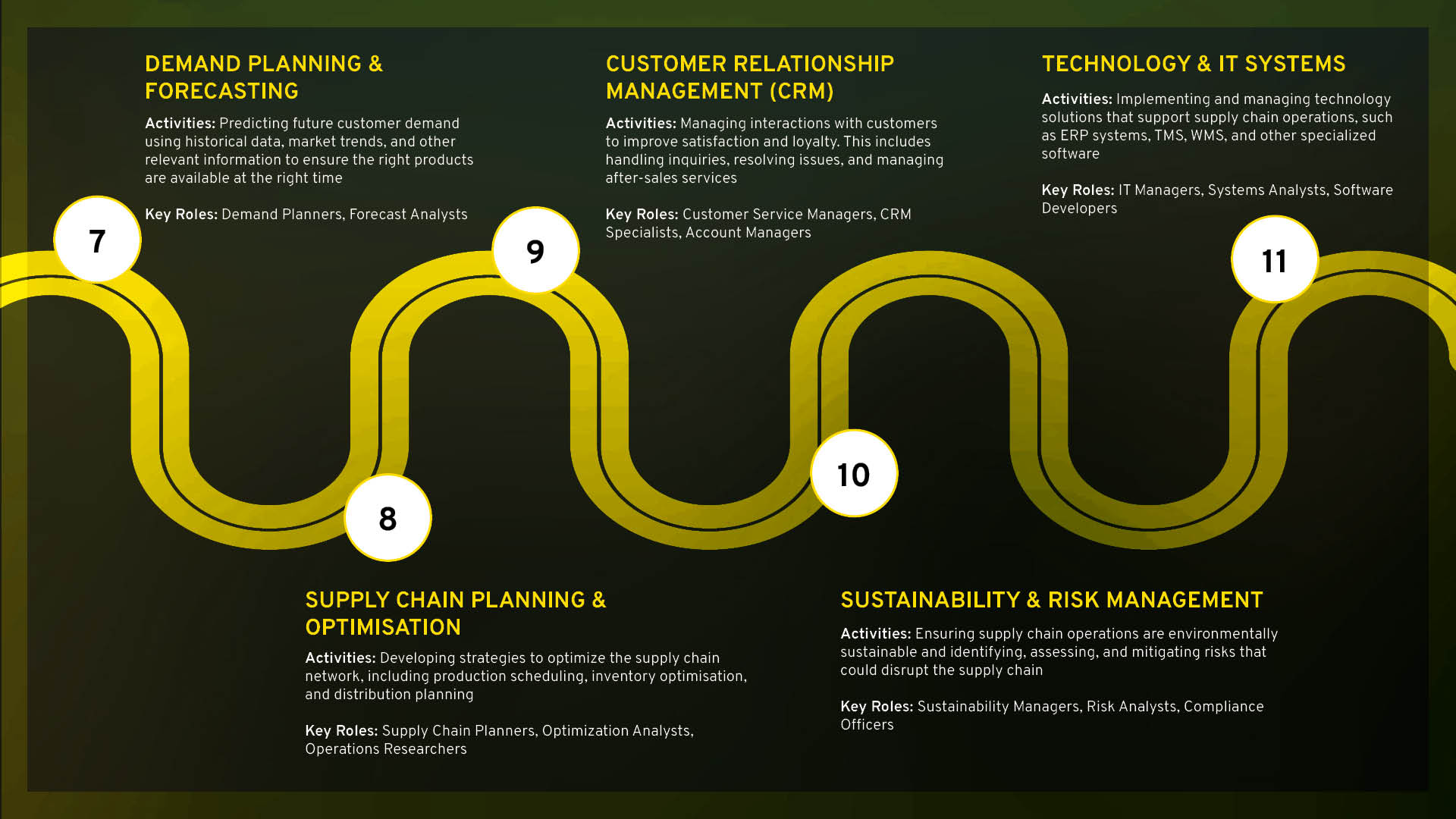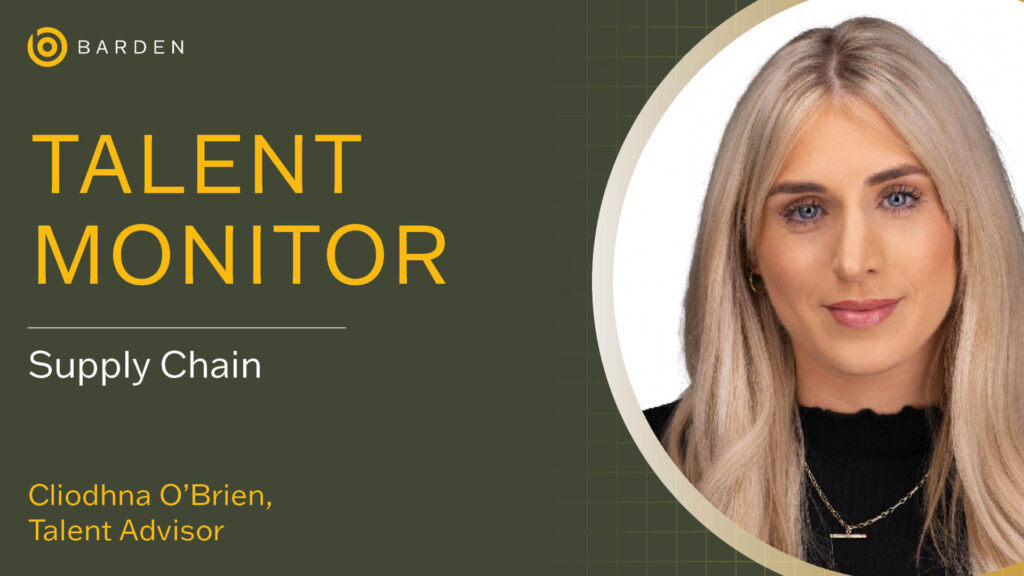Supply Chain Management is an ever-changing landscape and is steadily becoming more and more crucial to the overall success of a business. An efficient supply chain results in a company having competitive advantage. Let us help you understand the key verticals within this chain and the part they play in everyday life.
#1 Supply Chain Verticals


The variety of roles in the supply chain management space continues to grow and there are a significant number of distinct sectors or categories within the broader supply chain ecosystem nowadays. Each vertical encompasses specific functions, processes, and roles critical to the efficient operation and management of the supply chain. These include:
Each vertical plays a crucial role in the overall efficiency and effectiveness of the supply chain, contributing to the seamless flow of goods, information, and finances from suppliers to end customers.
#2 Variables
Various different variables will impact the nature of your role within the supply chain space. I have some of the key examples below that we see on a daily basis:
- Size of the business – Whether you are in an SME or Multinational company, this can have a significant impact on several factors. If you are in an SME type business your role is more likely to have a broader scope perhaps including several different areas, ie. Buyer/Planner, you if you are a Supply Chain Specialist you could be covering even more ground, ie logistics, purchasing, order management. The larger the team the more specialised the role is most circumstances.
- Global vs Regional roles – This again probably depends on the size of the business or the organizational structure. You may be working on a global scale covering a number of entities or you may be managing say production planning for one manufacturing site or you may be demand planning for a whole region/or multiple regions.
- Manufacturing site vs Shared Service Centre/HQ roles, in relation to the last point you may be in a centralised role, or you may be onsite where it all happens.
- The nature of the product will dictate both the scope of your role and the size of the team. Naturally manufacturing businesses require a large supply chain and procurement function, as they will have significant direct and indirect sourcing requirements, whereas a smaller business which offers a service as their product may require less manpower and the focus will be on indirect procurement for example as opposed to sourcing raw materials and packaging. The nature of your role will change again depending on whether its active ingredients, or finished products you are buying to sell on. All businesses require IT, marketing and professional services so indirect is almost guaranteed regardless of the type of business. Both are specialised areas and it can be tricky to move between the two.
- Value – the value of the product you are buying will vary from sector or sector, business to business.
- Volume – The volume of product your are sourcing will vary from business to business and category to category, ie. You may be negotiating an annual agreement for a marketing contract or you may be ordering raw materials in bulk on a monthly basis.
- Jurisdiction – There will be different rules and regulations in every jurisdiction, be is customs, or imports or regulations around packaging and production etc. For example a drink may be allowed to have a certain amount of an ingredient in one country but not in the next.
#3 Demand vs Supply
Here’s what we’ve noticed this quarter in the Supply Chain talent pool in Ireland:

#4 What are companies doing to attract talent?
Attracting talent in the supply chain vertical is crucial. Here are some strategies that we are seeing being used to attract talent in this area:
- Skills Development Programs: Companies invest in training and development programs to upskill existing employees and attract new talent. These programs cover areas like logistics, procurement, and inventory management. Continuous training programs ensure that employees are up-to-date with the latest industry trends and technologies. This demonstrates the company’s commitment to their professional growth.
- Internship and Co-op Programs: Offering internships and co-op opportunities allows students and recent graduates to gain practical experience. Many companies use these programs as a pipeline for full-time hires.
- Flexible Work Arrangements: Companies are adopting flexible work options, including remote work and flexible hours. This appeals to a diverse workforce, including parents and those seeking work-life balance.
- Competitive Compensation: Offering competitive salary is essential. Additionally, offering strong benefits such as pensions, health insurance, bonuses, and flexible working hours are crucial for attracting talent. Ensuring salary packages meet or exceed market expectations helps in retaining top talent.
- Emphasizing Purpose: Companies highlight their impact on global supply chains and sustainability efforts. Talented individuals are drawn to organisations with a clear purpose and positive impact.
- Embracing Diversity and Inclusion: Organizations are actively promoting diversity and inclusion (D&I) to expand their talent pools. By creating an open and inclusive work environment, companies can attract a wider range of candidates and foster innovation and creativity within their teams (Ibec)
- Promoting Internal Talent: Encouraging internal promotions helps create a sense of opportunity and career progression within the organization. This strategy not only builds loyalty but also maintains a consistent corporate culture, saving costs associated with external hiring and training (Deskera).
- Utilizing New Technologies: Companies are investing in new technologies such as artificial intelligence and machine learning to streamline processes and improve efficiency. Providing employees with the latest tools and technologies makes the work environment more dynamic and appealing (Deskera).
- Engaging in Strategic Partnerships and Events: Companies are also engaging with industry bodies and participating in events to address skills shortages. Initiatives like Logistics and Supply Chain Skills Week highlight career opportunities and promote the sector to a younger, more diverse audience (Ibec).
Creating an attractive workplace involves a combination of financial incentives, professional growth opportunities, innovation, a positive and supportive company culture as well as the companies vision and purpose being clear.
#5 Salary examples
- Inventory Analyst (SME) €50,000
- Procurement Analyst MNC (temp contract) €70,000
- Junior Purchasing Assistant (Entry level) €33,000
- Sourcing Manager (Large Irish Business) €75,000
- Senior Buyer (MNC) €88,000
- Head of Warehousing & Logistics (SME) €95,000
- Senior Planner €67,000
- Senior Manager Operations €90,000
- Category Lead €80,000
- Planning Team Lead €72,000
- New Product Introduction Specialist €65,000
You can expect a 10-15% reduction on the above numbers, when considering appointments outside of Leinster. For bespoke advice please contact cliodhna.obrien@barden.ie (Leinster & Munster)
#6 Challenges over the next 12 months
Over the next 12 months, Irish supply chains face several challenges:
- Global Market Uncertainty: Ongoing market volatility and economic uncertainty pose significant challenges for businesses.
- Supply Chain Disruptions: Renewed disruptions due to factors like the resurgence of COVID-19 in China and the Ukraine war are impacting supply chains.
- Inflation and Energy Costs: Rising fuel costs and inflation are putting pressure on supply chain operations.
- Skills and Talent Shortages: Finding and retaining skilled workers remains a concern for businesses.
- Sustainability: Companies are increasingly focusing on sustainability and green credentials to compete in international markets.
Despite these challenges, there’s optimism among Irish exporters, with 84% planning to enter new international markets in the coming year.
Companies in Ireland are adapting to supply chain challenges in several ways:
- Diversification: Businesses are diversifying their supplier base to reduce reliance on a single source. This helps mitigate risks associated with supply chain disruptions.
- Technology Adoption: Companies are investing in digital technologies like IoT, blockchain, and AI to enhance supply chain visibility, efficiency, and resilience.
- Collaboration: Collaborative efforts among supply chain partners are increasing. Companies are sharing information, coordinating logistics, and jointly addressing challenges.
- Resilience Planning: Organizations are developing contingency plans to respond swiftly to disruptions. This includes stockpiling critical components and identifying alternative routes.
- Sustainability Initiatives: Many companies are prioritizing sustainability by optimizing transportation routes, reducing waste, and adopting eco-friendly practices.
Overall, agility, adaptability, and forward-thinking strategies are key to navigating the evolving supply chain landscape in Ireland.
In Barden, we understand that each team, role, and requirement is unique. If you would like to discuss what tactics and approaches would suit you, please feel free to contact Cliodhna O’Brien, our Supply Chain Talent Advisor & Recruiter here in Barden (cliodhna.obrien@barden.ie); we’re where leaders go before they start looking for Supply Chain talent.
This information is accurate as per January 2026 and will be updated periodically. Data sources include Barden Proprietary Data, LinkedIn Analytics and other 3rd party data sources. If you have a request and would like real-time information to inform your hiring decisions, contact Cliodhna O’Brien at cliodhna.obrien@barden.ie.


 Jump Back
Jump Back

